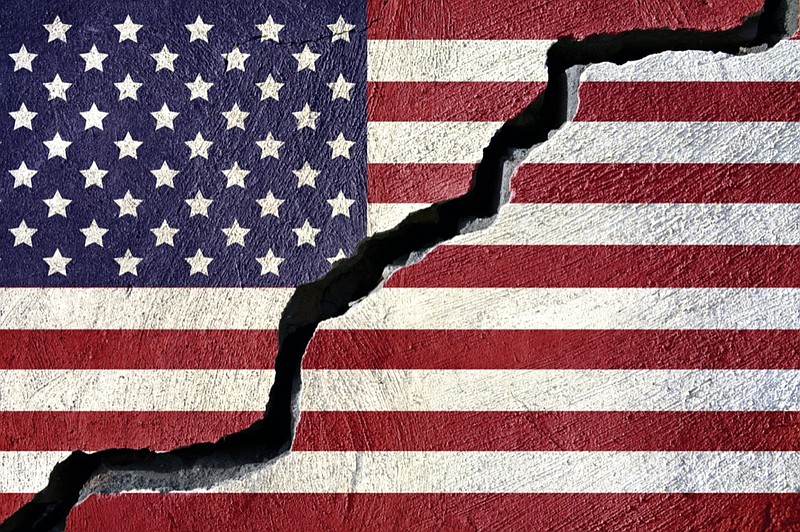Murray: Political realignment provides hope for less-polarized future
America seems deeply divided. The House of Representatives is split 222-213 between Democrats and Republicans, meaning just five seats need to flip to put Republicans back in control (two seats are still technically contested, including one won by just six votes). After the Georgia runoff races, the Senate is split down the middle, 50-50. Half the country, as in 2016, appears to believe the presidential election was stolen from their preferred candidate. It appears as if polarization is here to stay.
Or, maybe not. A careful look at underlying shifts in support among the parties suggests that America is in the middle of a political realignment. The process has yet to play out, but when it does it is likely that neither the MAGA wing of the Republican Party nor the democratic-socialist wing of the Democratic Party will be calling the shots.
That's because, while these two factions may appear dominant in American politics today, there are other factions still looking for a political home in our two-party system.
The first faction, which we might call the New Liberals, is in many ways the party of the suburbs. Generally college-educated people, often white, who are tolerant and not socially conservative but who, for the most part, live in traditional family units and want their children to go to good colleges. With many expressing visceral dislike for President Donald Trump, they swung to Joe Biden in the presidential election but appear to have trended back toward the GOP in the Georgia runoffs.
The second faction, which we might call the New Conservatives, are an aspirational group. Very often from immigrant families, they want the freedom to run a business and are worried by democratic-socialists who remind them of people who ruined their home countries. They want an end to the lockdowns but also to be made whole for the money they lost during them. Many voted for Trump during the presidential election but appear to have swung to the Democrats in the Georgia runoffs - perhaps in disgust at the Senate's refusal to allocate more relief money to ordinary Americans (as anecdotal evidence from activists suggests).
This suggests America's supposed polarization can be defeated by a party appealing to both groups and suppressing the instincts of its more vocal extremist wing. As the brief characterizations above suggest, they both have elements of traditional conservative and liberal leanings. This suggests that either major party might be able to unify factions. America's two-party system is built to encourage big tent coalitions.
What may prove most difficult is suppressing the more vocal factions. There is evidence that MAGA supporters failed to come out and vote in the Georgia runoffs, indicating perhaps a lack of appetite for compromise. Similarly, if the democratic-socialists refuse to compromise and insist on ramming through things the centrists view as extreme, they can just as effectively drive off centrists.
This is why it's important to realize that the realignment is still under way. How it will work out is yet to be seen. How the Biden federal government handles vaccinations and the end of lockdowns might determine the way the realignment proceeds.
Moderation is vital and necessary to ending America's polarization. Compromises will have to be made. The side more willing to compromise may earn substantial rewards and be in power for quite some time. An example is the political realignment in Britain in the 1990s, when Tony Blair repudiated old-style socialism and made his Labour Party friendly to free markets. The party won three elections easily and was only unseated by a Conservative Party that had adopted much of Blair's agenda.
Americans may be distraught at what they see happening to their country today. The scenes in Washington this week seem to suggest that America is irrevocably decided. Underlying patterns of voter behavior suggest otherwise, and that a more moderate and more unified America is just a couple of elections away.
Iain Murray is vice president for strategy at the Competitive Enterprise Institute. He wrote this for InsideSources.com.
Dolan: We are not so divided. Solutions to key issues share bipartisan support
President-elect Joe Biden is taking office in a deeply divided country - a point dramatically brought home by the violence at the Capitol on Jan. 6.
Biden has promised to bring a divided electorate together. Is this even possible?
Social divisions may take a generation to heal. But with enough political will, the answer on policy questions should be a resounding yes.
Despite our divisions, progressive responses to bread-and-butter issues enjoy broad, bipartisan support.
The most acute crisis facing the nation is the continuing pandemic and its fallout. Communities of color and low-income families have suffered the most, but Americans of all backgrounds and political affiliation have suffered sickness, death and growing economic insecurity.
The number of people officially living in poverty has risen by at least 8 million during the pandemic.
Voters of all stripes are demanding action. COVID-19 relief took center stage in Georgia, with Democrats Raphael Warnock and Jon Ossoff campaigning for $2,000 cash payments and ousting Republican incumbents who'd helped GOP Senate leader Mitch McConnell squash them.
But support for relief goes even deeper than that. A recent Data for Progress poll found 65% support nationally not just for the one-time $2,000 payments McConnell has resisted, but for monthly $2,000 payments to support Americans through the crisis.
After months of resistance, McConnell agreed to an 11th-hour relief package late last year. Many Americans were relieved to see their unemployment insurance continued and an extra $600 in their pockets, but these measures were too little, too late for millions behind on their bills. State and local governments have meanwhile been starved just when resources are needed the most.
Incoming President Biden has promised a "Marshall Plan" from the federal government to promote the needed distribution for state and local governments. Now, with a Democratic House and Senate, he should engage this broad bipartisan support to get one.
There's also broad bipartisan support about who should pay their fair share to support it: billionaires.
According to the Institute for Policy Studies, the combined wealth of America's billionaires has increased by more than $1 trillion during the pandemic. Poll after poll shows overwhelming support for raising taxes on this group, who got a huge tax cut under Trump. A recent Reuters poll found 77% of Democrats and 53% of Republicans supporting taxing billionaire wealth.
Other polls show support for popular ideas progressives have championed for years.
A recent CNBC poll found broad bipartisan support for raising the minimum wage to $15 an hour (60%), making public college free (57%), and "Medicare for All" (54%). Majorities of Republicans joined Democrats in supporting paid maternity leave and federally supported child care. More than 40% of GOP voters support increasing food assistance for people in poverty.
Finally, there's the U.S. Postal Service, which was badly battered and politicized under the Trump administration. Yet it remains the most popular federal agency of all, with over 90% of voters supporting crisis aid for the vital public service.
Bipartisanship won't solve all our problems. Republican support for racial equality and transgender rights still remains absent, so executive orders may be necessary to address these critical issues.
Yet it's clear that possibilities for bringing together such a deeply divided country not only exist but abound. Biden, Congress and voters must work hard to make sure the policies the majority of us support become law.
Karen Dolan directs the Criminalization of Race and Poverty Project at the Institute for Policy Studies. She wrote this for InsideSources.com.
Tribune Content Agency


